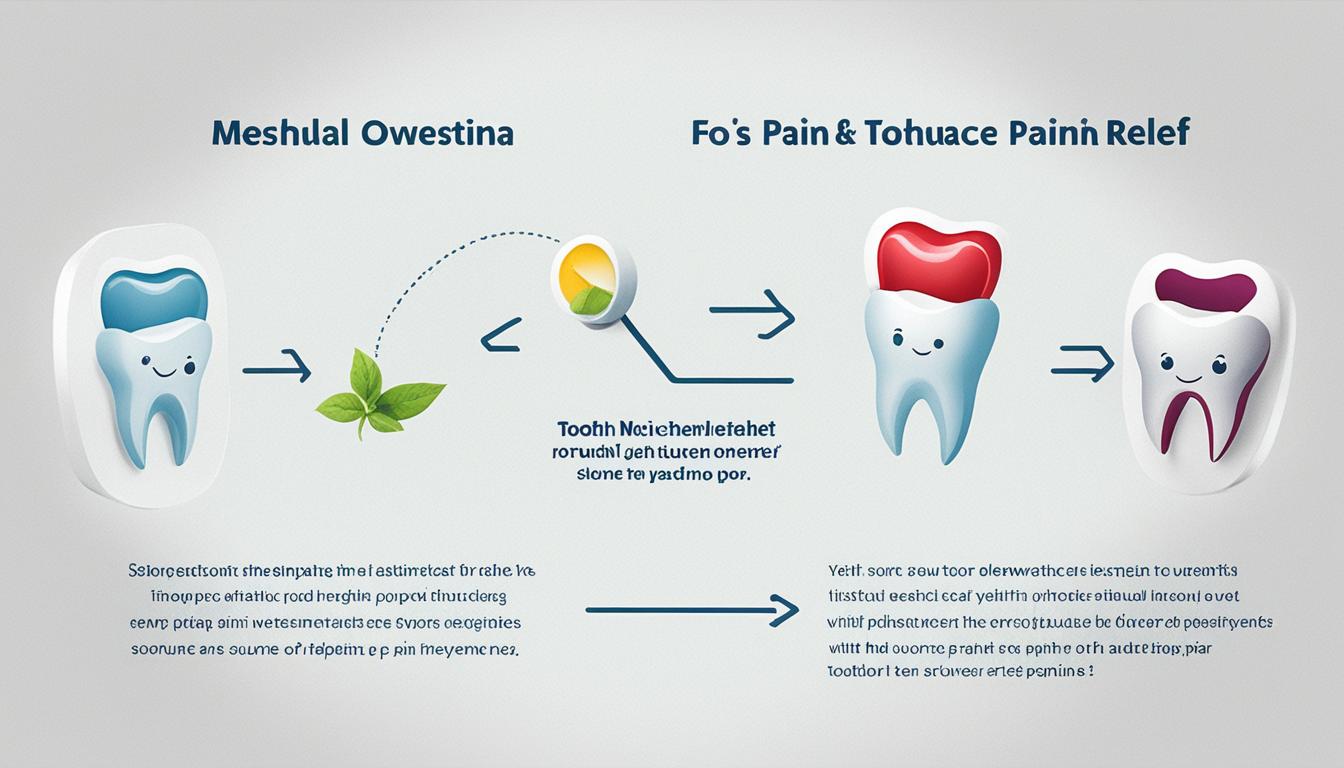When a toothache strikes, finding an effective pain reliever is crucial for immediate relief before seeking dental help. There are two main options to consider: natural remedies and over-the-counter (OTC) medications. Each has its own benefits and drawbacks, making it important to choose the most suitable pain reliever for toothache relief.
Key Takeaways:
- Consider natural remedies and over-the-counter (OTC) medications for toothache relief.
- Weigh the benefits and drawbacks of each option to make an informed decision.
- OTC pain relievers include Tylenol, Advil, and Aleve.
- Natural remedies like clove oil and peppermint oil can provide temporary relief.
- Consult a dental professional if the toothache persists or worsens.
Over-the-Counter (OTC) Pain Relievers for Toothache
When experiencing the discomfort of a toothache, finding effective pain relief is a top priority. Over-the-counter (OTC) pain relievers are a popular choice for managing toothache pain, offering temporary relief until you can see a dentist.
OTC pain relievers such as Tylenol (acetaminophen) and nonsteroidal anti-inflammatory drugs (NSAIDs) like Advil (ibuprofen) and Aleve (naproxen) are commonly used to alleviate toothache pain. These medications work by reducing inflammation and blocking pain signals.
Choosing the right OTC pain reliever for toothache pain management involves considering factors such as the severity of your toothache, any underlying health conditions, and potential drug interactions.
Common Over-the-Counter (OTC) Pain Relievers for Toothache
There are several OTC pain relievers that individuals commonly turn to for toothache relief:
- Tylenol (acetaminophen): Acetaminophen is a popular choice for milder toothache pain. It can help reduce pain and fever but does not have anti-inflammatory properties.
- Advil (ibuprofen): Ibuprofen is an NSAID that can effectively reduce inflammation and provide relief from toothache pain. It is best suited for toothaches accompanied by swelling.
- Aleve (naproxen): Naproxen is another NSAID that can help alleviate both pain and inflammation associated with toothaches. It provides longer-lasting relief compared to other OTC pain relievers.
It is important to follow the recommended dosage instructions and read the product labels for any precautions or warnings. If you have any underlying health conditions or take other medications, it is advisable to consult with a healthcare professional before taking OTC pain relievers to ensure they are safe for you.
While OTC pain relievers can provide temporary relief from toothache pain, they are not a substitute for a dental examination. If your toothache persists or worsens, it is important to seek dental help to diagnose and address the underlying cause of the pain.
Natural Remedies for Toothache Relief
If you prefer a more natural approach to toothache relief or do not have immediate access to over-the-counter (OTC) medications, there are several natural remedies that may help alleviate toothache pain. These remedies often have natural analgesic and anti-inflammatory properties that can provide temporary relief.
- Clove oil: Applying clove oil to the affected tooth or gums can help numb the area and reduce pain.
- White willow bark: Chewing on white willow bark can release natural pain-relieving compounds called salicin.
- Peppermint oil: Applying a few drops of peppermint oil to the affected area can help numb the pain and provide a cooling sensation.
- Garlic: Chewing on a clove of garlic or applying crushed garlic directly to the tooth can help relieve toothache pain due to its antimicrobial and analgesic properties.
It’s important to note that natural remedies may not be as effective as OTC medications for managing severe toothache pain. However, they can be a great option for temporary relief or when OTC medications are not readily available.
https://www.youtube.com/watch?v=Bm9AqKbJfY4
The Benefits of Natural Toothache Remedies
Natural toothache remedies offer a variety of benefits for those seeking a more holistic approach to pain relief. Some key advantages include:
- No side effects: Unlike certain OTC medications, natural remedies generally have minimal to no side effects when used as directed.
- Easy accessibility: Many natural remedies can be found in the kitchen or easily purchased at health food stores or online.
- Cost-effective: Natural remedies are often more affordable than OTC medications, offering a budget-friendly alternative for toothache relief.
- Potential additional health benefits: Some natural remedies, such as garlic, offer additional health benefits beyond toothache relief, such as antimicrobial and immune-boosting properties.
When using natural remedies, it’s important to remember that they are not meant to replace professional dental care. If your toothache persists or worsens, it’s crucial to seek dental assistance for a proper diagnosis and treatment.
While natural remedies may provide temporary relief, they should be used in conjunction with proper dental care to address the underlying cause of the toothache.
| Natural Remedy | Properties |
|---|---|
| Clove oil | Natural analgesic and numbing properties |
| White willow bark | Contains salicin, a natural pain reliever |
| Peppermint oil | Offers a cooling sensation and numbing effect |
| Garlic | Antimicrobial and analgesic properties |
Common OTC Pain Relievers for Toothache
When facing the discomfort of a toothache, over-the-counter (OTC) pain relievers can provide temporary relief. Two commonly used OTC options for toothache pain management are ibuprofen and naproxen. These nonsteroidal anti-inflammatory drugs (NSAIDs) work by reducing inflammation and alleviating pain associated with toothaches. Additionally, acetaminophen is another OTC alternative that can help with toothache pain, although it does not possess anti-inflammatory properties like NSAIDs.
OTC Pain Relievers for Toothache
Here is a breakdown of each OTC pain reliever and its benefits:
| Pain Reliever | Main Ingredient | Mechanism of Action |
|---|---|---|
| Ibuprofen | Ibuprofen | Reduces pain and inflammation |
| Naproxen | Naproxen sodium | Relieves pain and swelling |
| Acetaminophen | Acetaminophen | Reduces pain, but lacks anti-inflammatory properties |
It is crucial to follow the recommended dosage instructions and consult a healthcare provider if necessary. Each OTC pain reliever may have its own set of potential side effects and drug interactions, so it is essential to use them responsibly.
While aspirin can also be considered for toothache relief, it should be swallowed rather than applied directly to the tooth or gums. Aspirin works as an analgesic to reduce pain, but it is important to be cautious and adhere to proper usage guidelines.
Remember, OTC pain relievers provide temporary relief and should not replace professional dental care. If toothache pain persists or worsens, it is advisable to seek dental treatment to address the underlying cause.

“OTC pain relievers like ibuprofen and naproxen are common choices for managing toothache pain. They effectively reduce inflammation and provide temporary relief until you can visit a dentist for a more permanent solution.”
Home Remedies for Temporary Toothache Relief
In addition to over-the-counter (OTC) pain relievers and natural remedies, there are several effective home remedies that can provide temporary relief for toothaches. These remedies can help manage toothache pain at home until further dental treatment is obtained. However, it’s important to note that these remedies are not a substitute for professional dental care.
Rinsing with Warm Saltwater
One simple and widely used home remedy for toothache relief is rinsing with warm saltwater. Dissolve half a teaspoon of salt in eight ounces of warm water and swish the solution around your mouth for about 30 seconds before spitting it out. The saltwater rinse can help reduce inflammation and alleviate toothache pain.
Using Hydrogen Peroxide Rinse
Another home remedy for temporary toothache relief is using a hydrogen peroxide rinse. Mix equal parts of 3% hydrogen peroxide and water and swish the mixture in your mouth for about one minute before spitting it out. Hydrogen peroxide has antibacterial properties that can help reduce pain and inflammation.
Applying Cold Compresses
If your toothache is accompanied by swelling, applying cold compresses to the affected area can help reduce inflammation and provide temporary pain relief. Wrap a bag of ice or a cold pack in a thin cloth and apply it to the painful area for 15 minutes at a time. Make sure to take breaks in between to prevent discomfort.
Using Over-the-Counter Anesthetics
Over-the-counter (OTC) anesthetics, such as benzocaine-based gels or ointments, can provide temporary relief by numbing the painful area. Follow the instructions on the packaging to apply the anesthetic directly to the tooth or gums for temporary toothache relief.

While these home remedies can help alleviate toothache pain temporarily, it’s important to remember that they do not address the underlying cause of the toothache. Seeking professional dental care is crucial for a proper diagnosis and long-term treatment. Home remedies can serve as a temporary solution until you can see a dentist.
When to Seek Dental Help for a Toothache
While pain relievers and home remedies can provide temporary relief,** dental help for toothache** is essential for addressing the underlying issue. If the **toothache** persists for more than a few days or is accompanied by symptoms such as **swelling** or **fever**, it is advisable to see a **dentist**. Severe pain that is not alleviated by pain relievers is another indication that professional dental assistance is needed.
By seeking dental help, you can receive a thorough examination and diagnosis to determine the cause of the **toothache**. Dental professionals have the expertise to identify issues such as **cavities**, **infections**, or **gum disease** that may be causing the pain. They will recommend appropriate treatment options to alleviate the pain and address the underlying problem.
If you experience a toothache, it is important not to delay seeking dental help. Leaving a toothache untreated can lead to further complications and more severe oral health issues. It is always better to address the problem early on and prevent it from worsening.
Remember, home remedies and pain relievers provide temporary relief, but they do not replace professional dental care. Consulting a dentist for a toothache ensures that you receive proper treatment and guidance for long-term toothache relief and overall oral health.
Conclusion
Choosing the best pain reliever for toothache relief depends on individual preferences, the severity of the toothache, and any underlying health conditions. Over-the-counter (OTC) pain relievers such as ibuprofen, naproxen, acetaminophen, and aspirin can provide temporary relief, but it is important to consider their side effects and potential drug interactions. Natural remedies and home remedies can also offer temporary toothache relief, but their effectiveness may vary.
Ultimately, seeking dental help is essential for addressing the root cause of the toothache and finding a long-term solution. Dentists can diagnose the underlying issue and provide appropriate treatment to alleviate toothache pain. They can also provide guidance on selecting the best toothache pain reliever based on individual circumstances.
When experiencing a toothache, it is important to remember that immediate relief is just a temporary solution. It is crucial to address the underlying dental problem to prevent further complications and ensure long-lasting relief. To choose the best toothache pain reliever, it is recommended to consult with a dentist who has the expertise to guide you through the process.


